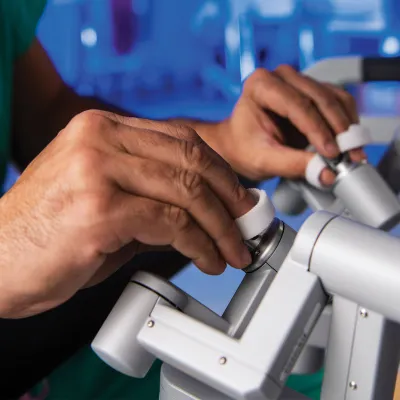
DHI Can Treat Bowel Blockages With Less Invasive Surgery Options
Bowel obstruction, sometimes called intestinal obstruction, requires immediate medical attention. The blockage may be in either the small or large intestines. Very often, the condition requires surgery, either immediately after diagnosis or as soon as the patient is well enough to tolerate a surgical procedure. The colorectal surgeons at the Digestive Health Institute are experienced in offering minimally invasive colorectal procedures. This approach allows patients to avoid having a large, open incision and leads to a faster recovery.
When the bowel becomes blocked, parts of the intestine can die. This can cause the intestine to tear, or perforate, and lead to an infection called peritonitis. Peritonitis is life-threatening and requires emergency care.
Whole-Person Care for Intestinal Obstruction
Bowel obstruction is almost always caused by another underlying medical condition.
Conditions that put people at a higher chance of having an intestine become blocked include:
- Adhesions, caused by scar tissue from an abdominal surgery
- Hernia in the abdomen
- Crohn’s disease
- Colon cancer
- Diverticulitis
When the intestine becomes blocked, some or all of the following symptoms may occur:
- Abdominal pain or cramping that comes and goes
- Abdominal swelling or bloating (usually severe)
- Inability to pass gas
- Constipation
- Loss of appetite
- Nausea and vomiting
- Fever and/or rapid heartbeat, symptoms of peritonitis
Seek immediate care if you experience symptoms of a bowel obstruction! Seeking care quickly is especially important if one of your symptoms is fever or you have an underlying medical condition known for causing blocked intestines.
If your doctor suspects you may have a bowel obstruction, he or she will likely order an imaging test such as a CT scan. A CT scan is a series of X-rays and can show where the intestine is blocked. For some obstructions, a barium enema or colonoscopy may be used alongside or in place of a CT scan.
If your imaging test shows you have a blockage, you will be hospitalized. Measures will be taken to stabilize you and relieve your abdominal swelling. Treatment will depend on the type of blockage you have and where it is located.
Treatment for a Partial Bowel Obstruction
If your intestine is only partially blocked, you will be stabilized in the hospital. You may need surgery, or your doctor may prefer to wait and see if the blockage clears on its own. If the blockage persists, you will likely need to have a colorectal surgery procedure.
Treatment for a Full Bowel Obstruction
If your intestine is completely blocked, it might be necessary to have surgery to remove the blockage and any portion of the intestine that has died. Whenever possible, the colorectal surgeons at DHI offer patients minimally invasive surgery. While more challenging to perform, it results in treatment as effective as a traditional open procedure. However, patients have less pain after their operations with minimally invasive surgery, and recoveries tend to be faster.
In some cases, immediate surgery may be less than ideal for the patient. Intestinal stenting may be used as an alternative. This is an endoscopic procedure that places a metal stent, a mesh tube, into the part of the intestine that is blocked. Once the stent is in place, it is opened up to expand the intestine so the blockage can pass. A stent also keeps a narrowed bowel open. Stenting to treat a bowel obstruction is often a temporary relief measure. Most patients will eventually need surgical treatment once they are strong enough for surgery.
Other Forms of Bowel Blockage Treated at DHI
A blocked bowel can arise from other conditions that require special treatment:
- Pseudo-obstruction is a condition in which a bowel is blocked for a non-mechanical reason. Often, problems with nerves in the intestines cause the pseudo-obstruction. The condition can be seen in patients with Parkinson disease, MS or even diabetes that has caused nerve damage. Depending on a patient’s situation, pseudo-obstruction is treated with medicine, colonoscopy, surgery or a combination of these treatments.
- Intussusception is a condition that is usually only seen in children age 2 and younger. It happens when the blockage is caused by part of the intestine telescoping on itself. It can often be treated non-surgically with an enema.
- Volvulus is a blockage caused by the intestine twisting on itself. Very often, this condition can be treated with an endoscopic procedure such as a colonoscopy. When the doctor passes the scope through the intestine, it usually untwists.
If you need care for a blocked intestine, call the Digestive Health Institute at 833-288-0248 for an appointment with a colorectal surgeon.

Recover Faster With Minimally Invasive and Robotic Surgery
All the surgeons at the AdventHealth Digestive Health Institute have a large depth of experience in offering minimally invasive surgery.

Meet Your Dedicated Experts
Our specialists are passionate about providing collaborative care that addresses your unique needs and goals while ensuring you feel informed and supported every step of the way. Learn more about our team and their areas of expertise.

Surgical Consultations For Digestive Cancer Without the Wait
Appointments Within Seven Days for Patients with Cancer
At AdventHealth Digestive Health Institute, we know that after being diagnosed with cancer, patients want and often need to begin treatment quickly. So we make it a priority to offer appointments for cancer surgery consultations within five business days, and often earlier.
Patients who are newly diagnosed with cancer, or have just found out they have cancer again, qualify for this priority access. Our surgeons will make themselves available to see you right away, even for a second opinion. We want to help you start your treatment as soon as possible.
Let Us Help You Feel Whole Again
Whether you’re experiencing new symptoms or want a second opinion on a diagnosis, our dedicated digestive health experts are here to help you find answers and a path forward. Request an appointment today to take charge of your health and get the personal support you need.
